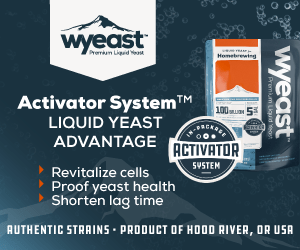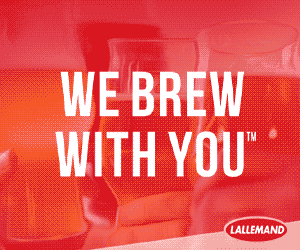Gale’s Prize Old Ale Clone
All-Grain Recipe
(5 gallons/19 L, all-grain)
OG = 1.092 FG = 1.017
IBU = 46 SRM = 19–25 (depending on the invert sugar used) ABV = 9.8%
Ingredients
13.5 lbs. (6.1 kg) English pale ale malt
2.86 lbs. (1.3 kg) #3 invert sugar (50 °L) or #1 invert sugar (10 °L)
22 oz. (624 g) torrified wheat
4.6 oz. (132 g) English black malt (600 °L)
6.3 AAU Fuggle hops (60 min.) (1.25 oz./35 g at 5% alpha acids)
6.3 AAU U.K. Goldings hops (60 min.) (1.25 oz./35 g at 5% alpha acids)
1.25 oz. (35 g) Fuggle hops (0 min.)
1.25 oz. (35 g) U.K. Goldings hops (0 min.)
1⁄2 tsp. yeast nutrients (15 min.)
1⁄2 tsp. Irish moss (15 min.)
White Labs WLP017 (Whitbread II Ale) Wyeast 1099 (Whitbread Ale), or SafAle S-04 yeast
Dregs from a bottle of Gale’s Prize Old Ale, White Labs WLP665 (Flemish Ale Blend), or Wyeast 3763 (Roeselare Ale Blend)
1⁄2 cup corn sugar (if priming)
Step by Step
I use Simpsons Finest Pale Ale Maris Otter or Golden Promise as my base grain, but other malts of a similar nature should work well. Simpsons black malt is my preference, but any high-quality English black malt will do.
Mill the grains and dough-in targeting a mash of around 1.5 quarts of water to 1 pound of grain (a liquor-to-grist ratio of about 3:1 by weight) and a mash temperature of 152 °F (67 °C). Hold the mash at 152 °F (67 °C) until enzymatic conversion is complete. Infuse the mash with near-boiling water while stirring or with a recirculating mash system raise the temperature to mash out at 168 °F (76 °C). Sparge slowly with 170 °F (77 °C) water, collecting wort until the pre-boil kettle volume is around 6.25 gallons (23.7 L) and the gravity is 1.062 before the addition of the invert sugar. If you should come up short on the pre-boil gravity, you can top it off with some dried malt extract.
The total wort boil time is 90 minutes. This helps concentrate the wort and aids in the development of flavor compounds. You should check the gravity of your wort before you add your first hop addition. If the boil is not tracking according to plan, keep boiling until you are at the right gravity, and then add your first hop addition. The first hop addition comes with 60 minutes remaining in the boil.
The historic beers were brewed with invert #3, but Henry Kirk was only able to source invert #1 for the 2022 batch. The darker, richer #3 adds more caramel and fig notes after fermentation. I think either works well, but if you can source (or make your own) #3 then use that. You can add the invert sugar at any time, but I like to add it with approximately 30 minutes left in the boil. If your invert sugar is in block form, cut it up before adding to the kettle and you may want to turn off the burner and stir to ensure the sugar dissolves without burning. If you cannot find invert sugar at your local homebrew shop, try making your own using the instructions in the sidebar on page 31. Add Irish moss or other kettle finings along with some yeast nutrients with 15 minutes left in the boil.
When the boil is complete, chill the wort to 68 °F (20 °C) and aerate thoroughly. Due to the high gravity of this beer, it is important to pitch enough yeast. Check the supplier’s calculators to determine the correct rate. Generally, you will need two packages of liquid or dry yeast for this beer. Ferment at 68 °F (20 °C) to start, raising the temperature gradually to 70 °F (21 °C) for the last 1⁄3 of fermentation. When finished, carbonate the beer to approximately 1.8 volumes.
Post fermentation you can add the dregs from a bottle of Gale’s Prize Old Ale, if you are lucky enough to purchase one. The bottles are not pasteurized or sterile filtered and contain the original organisms. If you cannot get your hands on a bottle, you could add a mixed culture such as White Labs WLP665 (Flemish Ale Blend) or Wyeast 3763 (Roeselare Ale Blend). While these cultures can produce noticeable souring when added to wort, when added to a beer already beyond 9% ABV the effect should be slower and muted. Over time the beer should develop nice dryness, a slight tartness, and some notes from the Brettanomyces. This process will also increase the carbonation over time as the longer chain sugars are consumed, so you want to take that into account if you add any priming sugar.
Extract With Grains Recipe
Substitute the pale ale malt and torrified wheat with 9.25 lbs. (4.2 kg) Maris Otter liquid malt extract and 19 oz. (540 g) wheat dried malt extract.
Always choose the freshest extract that fits the beer style instead of focusing on the brand name. If you cannot get fresh liquid malt extract, it is better to use an appropriate amount of dried malt extract (DME) instead.
Mill or coarsely crack the specialty malt and place loosely in a grain bag. Steep the bag in about 1 gallon (4 L) of water at roughly 170 °F (77 °C) for about 30 minutes. Lift the grain bag out of the steeping liquid and rinse with warm water. Allow the bag to drip into the kettle for a few minutes while you add the malt extract. Do not squeeze the bag. Add enough water to the steeping liquor and malt extract to make a pre-boil volume of 6.25 gallons (23.7 L) and the gravity is 1.062 before the addition of the invert sugar. Stir thoroughly to help dissolve the extract and bring to a boil.
The total wort boil time is 60 minutes. Follow the boil, fermentation, and packaging instructions for the all-grain recipe.





